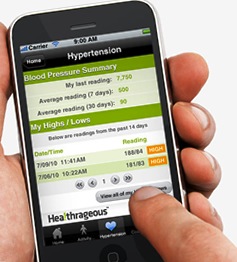 The Boston Globe has a high-level overview of some recent (small scale) efficacy studies about mobile health as well as a few updates on Boston-area companies and individuals working in mobile health today.
The Boston Globe has a high-level overview of some recent (small scale) efficacy studies about mobile health as well as a few updates on Boston-area companies and individuals working in mobile health today.
"Often patients come in, and they sort of expect some magic cure,’’ Massachusetts General Hospital's Dr. Kimberly Parks told the Globe. “The truth is, most chronic illness requires participation. I think this puts responsibility on the patients, and it improves the quality of their care.’’
One of the startups profiled in the article is Healthrageous, a spinout of Partners Healthcare's Center for Connected Health. The Globe reports that more than 1,000 consumers are already using apps created by the company, which offers mobile health services for weight loss, diabetes, hypertension and more. This is how the Globe describes some of Healthrageous' offerings:
"Imagine an app that connects directly to your blood-pressure monitor, scale, or glucometer, and not only shows you how you are doing, but also offers expert advice and alerts your doctor at the first sign of trouble, so he or she can adjust your medication."
The company signed up EMC during one of its original pilots. The company also announced last December a new iPhone app available direct to consumer via the Apple App Store. The app, called h!GO, aims to help users shed unhealthy habits and embrace healthy lifestyles. The app also aims to aid in the effective self-management of blood pressure and blood sugar. This mobile app is currently available to Healthrageous customers on devices including as the iPhone, Droid and Blackberry.
The Boston Globe article also reported on the work Dr. John Moore, a researcher at the MIT Media Lab, is doing in mobile health. Moore is building a system called CollaboRhythm, according to the report. Moore's apps to date have focused on HIV, hypertension, and diabetes and each aim to redefine the doctor-patient relationship. Moore refers to those two players as “person and health coach," the Globe reported. Here's more:
"The system includes visual tools that show how medications work, for example, and what happens when you miss a pill. It offers multiple ways for patients to analyze their data and involves regular communication with the doctor, by text, voice, or video," the Globe reported.
Read the full article over at the Boston Globe's Boston.com website here















